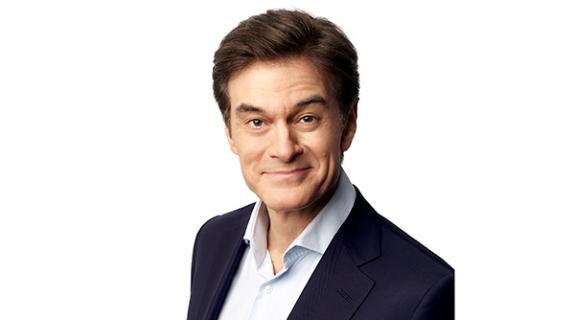Dr. Mehmet Oz offered plenty of public health information around the pandemic in a live Q&A with Good Day LA’s Tony McEwing in Tuesday’s opening session of Promax’s Virtual Station Summit.
Oz, who remains a practicing cardiologist while hosting his syndicated daily talk show Dr. Oz, shared his extensive knowledge of the pandemic, including information about statistics and data, testing, medical practices, progress on potential vaccines and the importance of mask-wearing.
Asked why the numbers have spiked, Oz said, “The states that started to open on May 1 were states where there wasn’t a lot of illness ahead of time. That gave people in those states a false sense of confidence. Then Memorial Day came and that’s when the crisis happened because people started getting really sloppy. Younger people went out on Memorial Day weekend and enjoyed their plans like nothing was going on.
“That allowed super spreader events to happen. The virus does not spread by us touching things or when we’re jogging by someone else and they exhale on us,” Oz said.
“The main way people get the virus is when they violate the six-feet rule for more than ten minutes at the same time they aren’t wearing a mask. That’s how the virus gets spread—in poorly ventilated smaller rooms, bars, restaurants and elevators.
“Now that we understand where the real risks are, we need to double-down and focus.”
McEwing also asked how the wearing of masks has become so divisive and Oz reiterated that wearing a mask has no political connotation and is purely about protecting people’s health. What’s more, wearing masks allows people to go about their lives in a more normal fashion.
“Wearing a mask allows us to live our lives in freedom,” Oz said. “They are not a restriction, they are a freeing element.”
Oz attributed Arizona’s success in bending its spiking curve party to wearing masks as well as the state’s reclosing of bars and limiting restaurant capacity to 25% when people are seated indoors.
“We are seeing a light at the end of the tunnel if we don’t mess it up again,” Oz said.
Oz agreed with the experts that although the U.S. has not exited the first wave of coronavirus, a second wave is coming in the fall. How that will affect us depends on how we react to it as a society, he said.
“Yes, we’re going to have a second wave. How important of a second wave it will be is a debate,” Oz said. “I think what happened this summer is a slip-up. It’s a dress rehearsal for what’s coming in the fall.”
While it won’t protect anyone from COVID-19, Oz recommended that everyone get a flu shot this season in order to prevent hospitals having to also deal with people sick with the flu.
“Europe has one-tenth the number of new cases we have right now. Why? Because they took this seriously. We have to do this right. We can be there and not be hurt in a second wave if we take the virus seriously,” Oz said.
Responding to one of the most controversial issues that have popped up during the pandemic—whether or not to send kids back to school—Oz said he personally felt it was safe to send younger kids back. In fact, he feels that keeping younger kids out of school and socialization opportunities is doing more damage to them than the risk of contracting coronavirus because younger children don’t seem to get the disease.
I have grandchildren in that age group and … I believe the harm we do to kids in kindergarten through 6th grade by not putting them in school is meaningful. We have to find a way of getting the kids back to school,” he said, elaborating on some of the precautions he feels should be taken, like smaller classes and plexiglass barriers between students and teachers.
That said, Oz wouldn’t send high-school or college-aged kids back to school because they can contract the disease and the damage done to them by not going to school is far less.
While the U.S. is still setting daily record highs when it comes to coronavirus diagnoses, there is some medical good news. Doctors and nurses have developed ways to deal with the disease so that it is not as fatal, such as using a steroidal drug that reduces the amount of antibodies in the body that are overreacting to the virus.
“We’ve cut in half the number of people who get admitted to ICUs, making a dent on the mortality rates. That’s why we’re not seeing the elevated mortality rates,” Oz said.
Asked what his biggest fear is around the coronavirus, Oz said that it was vaccines not working on elderly people who are already especially susceptible to the virus.
“I’m worried the vaccines will not work on the elderly, he said. “Their immune systems are not as strong. I’m fearful that people who need this vaccine the most won’t get the benefit. One way to potentially combat this is by using a ring vaccination system in which you vaccinate all of the people around them.”
While Oz said it will probably be another 9 to 12 months of living in this new reality, he has hope that one of the 150 vaccines now being developed will come through in the next six months.
“The entire country is now taking this seriously. Now I think everyone gets the story. We’ll only get there if we’re smart about the basics.”













































__twocolumncontent.jpg)











